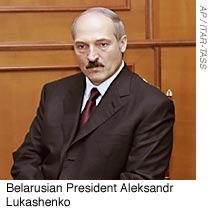Moscow, February 10, 2006—The Belarusian government’s persecution of the country’s few independent newspapers undermines the integrity of the March 19 presidential election in which Aleksandr Lukashenko seeks a third term, the Committee to Protect Journalists and two regional press freedom organizations said today. The groups called on the Russian Federation, the European Union, and the United States to renounce the vote if Belarusian authorities continue to deny the public access to independent reporting.
“No election can be valid when voters are deprived of independent news about the candidates and their positions,” Alex Lupis, CPJ senior program coordinator, told a press conference at the Independent Press Center in Moscow. “We’re calling on the international community to condemn these abuses against the media and to repudiate the March 19 election unless independent journalists can work freely and inform Belarusian voters about the campaign.”
Lupis traveled to Moscow after spending four days in Belarus meeting with independent journalists. The press conference was held in Moscow because restrictions on the Belarusian press would limit coverage. Lupis was joined in Moscow by Svetlana Kalinkina, managing editor of Belarus’ largest opposition paper, Narodnaya Volya; Andrei Bastunets, deputy chairman of the Belarusian Association of Journalists; and Oleg Panfilov, director of the Moscow-based Center for Journalism in Extreme Situations.
Lukashenko’s administration has moved aggressively to limit coverage in the run-up to the vote, CPJ research shows. In December, Lukashenko signed into law amendments to the penal code that criminalize criticism of the president and his government. The law provides up to five years in jail for those who disseminate through the media “appeals” to international organizations or foreign governments that are deemed harmful to national security interests. The legislation does not explain what is meant by appeals, nor does it define what is harmful to security interests.
In recent months, police have seized entire print runs of opposition newspapers without explanation and prevented international journalists from reporting in Belarus, CPJ research shows. The national postal carrier Belpochta has refused to distribute more than a dozen opposition and independent titles, while banks have frozen the accounts of several opposition newspapers. Narodnaya Volya has been forced to print its editions in the Russian city of Smolensk since October 2005, after local printing companies dropped the contract under pressure from the Information Ministry.
“The state’s main tool against the independent newspapers is to increase our financial expenses while imposing a total ban on distribution,” said Kalinkina, a 2004 recipient of CPJ’s International Press Freedom Award. “The Belarusian authorities are using these tactics because they want to be able to say they didn’t close the newspapers and that journalists decided to stop working on their own.”
A steady flow of new regulations and rulings over the past year illustrates those tactics. Lukashenko signed a presidential decree in May 2005 that banned independent media from using the words “Belarus” or “national” in their titles and required them to reregister with new names. The next month, the president signed a law increasing taxes on newspaper distributors. Politicized libel convictions nearly bankrupted Narodnaya Volya and the business daily Belorusskaya Delovaya Gazeta.
“Newspapers are forced to set up their own informal distribution systems because publishers, state newspaper distributors, and the post office refuse to do business with them,” Bastunets said. In late 2005, Soyuzpechat, the state-owned distribution agency, refused to sell 19 opposition and independent newspapers at street kiosks, according to the Belarusian Association of Journalists.
“President Lukashenko, his government, and the parliament of Belarus have created a situation where campaign coverage in the Belarusian mass media benefits only the incumbent,” said Oleg Panfilov, head of the Moscow-based Center for Journalism in Extreme Situations. “Such an atmosphere has been systematically built during Lukashenko’s rule, with radio stations, newspapers, and Internet sites gradually being destroyed.”
A constitutional amendment enabling Lukashenko to seek a third term was passed in October 2004 in a vote that the Organization for Security and Cooperation in Europe said “fell significantly short” of democratic standards. Lukashenko and senior administration officials received more than 90 percent of the pre-election television coverage, according to the OSCE, the pan-European monitoring organization. The government suspended the operations of at least a dozen newspapers before the vote.
Self-censorship is widespread as well, a product in part of the government’s failure to properly investigate the murders of three journalists: ORT cameraman Dmitry Zavadsky, who disappeared in July 2000; Veronika Cherkasova, a reporter for the opposition weekly Solidarnost, who was stabbed to death in October 2004; and Vasily Grodnikov, a freelance journalist for Narodnaya Volya, who died from a head wound in October 2005. Here are details of the cases:
• In the Cherkasova case, authorities focused on the victim’s teenage son as a suspect but have not investigated work-related motives. The son, 16-year-old Anton Filimonov, was arrested on December 28 on unrelated counterfeiting charges and has been in detention since. His grandparents and local human rights organizations expressed deep concern about Filimonov’s safety and say that investigators have been pressuring the teenager to “confess” to murdering his mother.
• Zavadsky, a Belarusian cameraman for the Russian public television station ORT, was reported missing after he failed to keep an appointment with colleague Pavel Sheremet. Sheremet and Zavadsky had recently traveled to Chechnya to shoot “The Chechen Diary,” a documentary about the war. CPJ sources in Belarus suspect that Zavadsky was abducted because he had footage that showed Belarusian security agents fighting alongside Chechen rebel forces. A 2003 report by the Council of Europe alleged that high-level government officials were involved in the journalist’s disappearance, but the public prosecutor’s office has closed its investigation without arrests.
• Grodnikov, a freelancer who wrote for Narodnaya Volya, was found dead in his apartment with a head wound. His apartment was ransacked, but his niece said that there was no sign of robbery or forced entry. He covered social issues for the newspaper.
